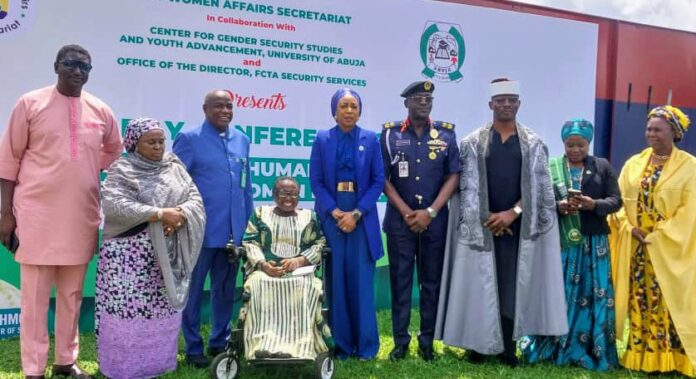Stakeholders have advocated the involvement of women in the development and implementation of strategies to enhance security in the Federal Capital Territory
By Angela Atabo
Stakeholders have advocated the involvement of women in the development and implementation of strategies to enhance security in the Federal Capital Territory (FCT).

The stakeholders made the call in Abuja on Monday, at a two-day conference on “Gender and Human Security: Focus on Women in the FCT.”
The conference was organised by the Women Affairs Secretariat and Security Services Department, FCT Administration, in collaboration with the Centre for Gender Security Studies and Youth Advancement, University of Abuja.
The Mandate Secretary of the secretariat, Dr Adedayo Benjamins-Laniyi, argued that the role of women in community development goes beyond the domestic sphere.
According to her, women have the capacity to bring unique perspectives and solutions, essential to the development of comprehensive security strategies.
’‘As primary caregivers, educators, and community leaders, women possess invaluable insights into the root causes of insecurity and the means to address them effectively.
“As such, women must not only be included, but positioned at the forefront of our security interventions as drivers of solutions to tackle the security challenges confronting humanity.
“It is, therefore, crucial to have women representation in policy-making processes; their voices must influence legislation and policies that address security issues and the policies should be inclusive and address gender specific challenges.
“For maximum results, women should be empowerment through education and training, policy formulation and advocacy, leveraging technology to secure FCT and Nigeria at large.”
Benjamins-Laniyi also stressed the need for women-led security networks and vigilante groups to unleash their full potential.
She further advised the creation of a platform to harness women’s intelligence-gathering capabilities.
“There is also the need for a cultural reorientation through media campaigns, community engagements and so on, to value and recognise women’s contributions in society.
“This will re-engineer societal perceptions about women’s roles in security,” she said.
Also speaking, the acting Vice-Chancellor (VC) of University of Abuja, Prof. Aisha Maikudi, pointed out that despite women constituting a significant proportion of the nation’s population, their participation in politics and leadership roles in security architecture had been very insignificant.
The VC, who was represented by Dr Gloria Ibikunle, the Director, Centre for Gender Security Studies and Youth Advancement of the university, lamented that women bear the brunt of societal ills, yet their voices were hardly heard.
According to her, women’s voices should not only be heard, but prioritised, adding that the inclusion of women and their needs at all levels will bring unquantifiable benefits to the nation.
Maikudi further asked: “Are we here to talk about gender equality? If it is offensive, then let’s talk about gender equity; if that is offensive, let’s talk about gender inclusivity.
“If that is also offensive, then let’s talk about gender rights; if that is offensive, let’s talk about gender interest; if that is equally offensive, then let’s talk about gender mainstreaming. At least, in all of these, we will talk about gender and human issues,’’ she said.
On his part, Dr Adamu Gwary, Director, Security Services Department, FCTA, said that security agencies in the FCT were doing all they can to address security challenges in the nation’s capital.
Gwary explained tha steps were being taken to involve women in the FCT security architecture with a view to harness their potential in driven solutions to security challenges in the territory.
“Mainstreaming gender in security decision-making prices is a new development, and if FCT gets it right, Nigeria would get it right,” he said.”’
The Etsu Kwali, Mr Luka Nizassan, who spoke on behalf of traditional leaders, expressed confidence in the capacity of women to contribute significantly in addressing security challenges in the country.
Nizassan said: “It is time for Nigeria to embrace human security to augment the concept of physical security, leveraging on a people-centred approach.
“What happens to the health needs of our people, the economy, social and environmental threats plaguing us ? If these are addressed, we would have addressed security.
“Also, if we involve women, we will be able to achieve our targets, which are the security and general wellbeing of our people.’’
The UNwomen Country Representative to Nigeria and ECOWAS, Beatrice Eyong, equally noted the critical role of women in human development.
Represented by Mr Peter Mancha, an official of UNWomen, the country representative, described gender mainstreaming in human security as a “smart move”, adding that none of the Sustainable Development Goals would be achieved without women. (NAN)




